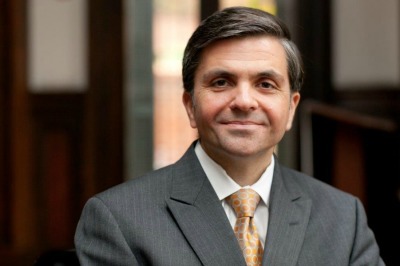Why Are Americans Happy & Religious?

A new Pew survey of 44 countries reiterates what other surveys have shown for years: Americans are more religious and Americans are more hopeful about their ability to improve their future than are other wealthy countries.
Americans are more prone to think hard work will uplift, to reject thinking that outside forces control their destinies, to be happy and to prioritize religion. Over half of Americans say religion is very important to them, twice the rate found among Canadians, Australians, British and other wealthy nations.
In fact, Americans have more confidence that hard work will uplift than any other country. And Americans reject fatalism more than any country than, interestingly, Venezuela, which is perhaps Venezuelans subversively rejecting the nonsense rhetoric of their socialist regime.
Here's a quote from Pew:
The survey also highlights how Americans are different from many others around the world on questions related to individualism, a value often associated with American exceptionalism. Fifty-seven percent of Americans disagree with the statement "Success in life is pretty much determined by forces outside our control," a considerably higher percentage than the global median of 38%. Similarly, Americans place an especially strong emphasis on the value of hard work – 73% think it is very important to work hard to get ahead in life, compared with a global median of 50%.
Such confidence in hard work in America obviously reflects the undying Puritan work ethic, still strong after 400 years, and reinforced by countless waves of ambitious immigrants. As to rejecting "forces outside our control," this American trait is also rooted in historic Puritan/Anglo Protestant confidence about providential mastery over the future. Calvinists may have believed in predestination but not determinism or passivity. Americans, even the non-religious, are culturally embued with a notion of individual and national purposefulness.
Although not directly addressed in this survey, American rejection of fatalism also makes Americans less prone to the sorts of conspiracy theories that more commonly captivate and delude other cultures, especially under authoritarian and totalitarian regimes. Christian beliefs in the limits of evil under Providence offer some restraint on paralyzing conspiracism.
There's an ongoing narrative right now that America is inexorably becoming more secular. Even if true, America remains more religious than other wealthy countries. But this narrative is too simplistic and overstates fragments of trends. Americans are less tied to denominations. And the religiously nominal are disavowing formal religious categories. But religious Americans are about as religious as ever, and even the purportedly non-religious remain more influenced by religion than often realized.
Americans have more confidence in free markets, according to Pew, than any country except, revealingly, communist Vietnam. Yet Americans, like other wealthy countries, are pessimistic currently about their economic future, compared to more hopeful Asians with fast growing economies. But Americans have suffered from economic doldrums before and will likely regain their optimism after this current bout. Optimism is intrinsic to American history and culture.



























